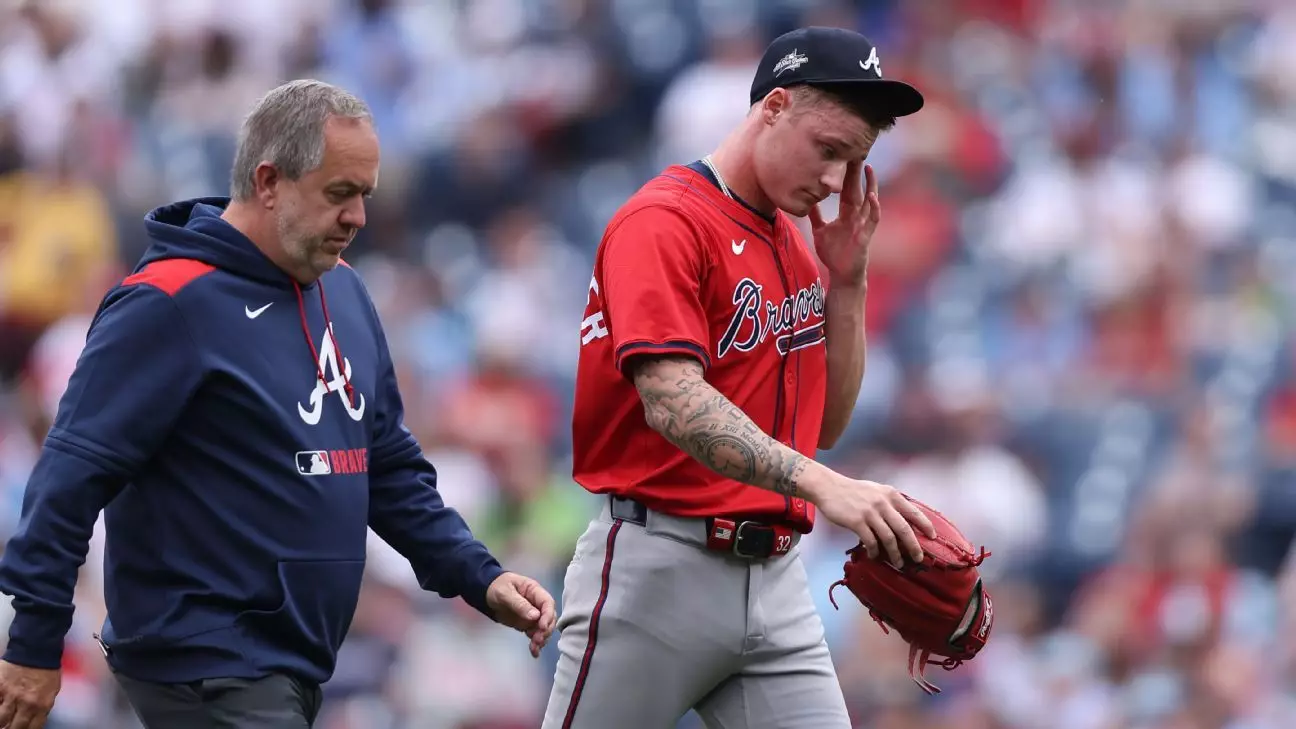The Brave Fight: Overcoming Setbacks and Reimagining Futures in Atlanta
There’s something quite profound about the resilience of a sports team, especially when faced with unforeseen setbacks. The Atlanta Braves are currently demonstrating this very tenacity as they navigate through challenging times in their pitching lineup. The recent news about AJ Smith-Shawver’s Tommy John surgery has hit hard, serving as a stark reminder of how unpredictable sports injuries can be. Yet, it also marks the beginning of a journey—a long, uncertain road to recovery for the 22-year-old pitcher who had been showing great promise this season.
Smith-Shawver’s performance on the mound, boasting a 3.86 ERA and a commendable strikeout record in his nine starts, has already caught the attention of many. But now the Braves face the dual challenge of nurturing this budding talent while managing the adversity that comes with such injuries. Manager Brian Snitker’s perspective offers a glimpse of hope amidst the turmoil, suggesting that this setback could potentially forge a stronger, more resilient player in the future. It’s an outlook that not only reflects optimism but also highlights the human spirit’s capacity to adapt and overcome.
In these testing times, it’s easy to feel overwhelmed by uncertainty. Yet, as fans and followers of the Braves, it’s important to remember that athletes are not just players; they are individuals with dreams and ambitions. They too face moments of doubt and fear but continue to push forward with determination. This personal connection to their journey is what makes sports so captivating—the ability to witness raw human emotion and perseverance unfold right before our eyes.
Key Takeaways
- The Braves are dealing with significant challenges due to injuries and roster changes.
- AJ Smith-Shawver’s recovery is crucial for his future career and team’s success.
- Craig Kimbrel’s free agency decision adds complexity but opens new possibilities.
- Balancing youthful talent with veteran experience is key for long-term success.
History Revisited: Kimbrel’s Path to Free Agency
Adding another layer of complexity to the Braves’ current situation is Craig Kimbrel’s decision to elect free agency after being designated for assignment. As one of Atlanta’s most legendary closers, Kimbrel has left an indelible mark on the franchise. His choice to step away from the team in pursuit of reviving his career elsewhere underscores the immense pressure faced by seasoned athletes. It’s a reminder that even those who have reached great heights must continually adapt to remain relevant in professional sports.
Kimbrel’s journey from celebrated All-Star to free agent serves as a poignant illustration of the harsh realities that athletes often encounter. The dynamic nature of team compositions means that no player is immune to change—not even those who have achieved considerable success. This transition highlights not only the fleeting nature of athletic careers but also the opportunities for reinvention that come with embracing new challenges.
The Battle of Youth vs Experience
The narrative unfolding within the Braves organization is emblematic of a classic sports tale—the clash between youthful exuberance and seasoned experience. On one hand, Smith-Shawver symbolizes the bright future that lies ahead for the team. He possesses the potential to become a cornerstone within their pitching lineup, representing hope and fresh energy. On the other hand, Kimbrel embodies rich history and deep emotional ties, reminding us all of where we’ve been.
This juxtaposition raises important questions about how best to balance these two forces effectively. Youth brings vigor and innovation while experience offers wisdom and stability; when harmonized correctly, they can create something truly formidable. However, mismanagement could lead to unintended consequences—either stifling emerging talents or overlooking valuable insights from veterans who have weathered storms before.

Reimagining Success: What Lies Ahead
Despite these hurdles standing before them like towering mountains yet unscaled ,the future still holds promise if approached strategically by integrating innovative strategies alongside focused rehabilitation efforts paving way towards lasting success .As much arduous task awaits young Smith-Shawvers road ahead may offer lessons advanced medical technologies training methodologies benefitting other players organization simultaneously while Kimbrels venture into free agency waters opens doors elsewhere possibly returning rejuvenated mindset .Both narratives encapsulate broader theme within relentless pursuit excellence amidst failures perseverance ultimately shaping path forward brighter tomorrow awaits those daring enough seize it
The Atlanta Braves find themselves at an intriguing juncture—a point where adaptability becomes essential navigating complexities current situation requires recognizing each challenge opportunity growth balancing delicate act between potential emerging talent hard-earned wisdom veterans crucial achieving greatness beyond mere scoreboard victories rather embodies character resilience enduring quest triumph adversity .It’s not solely about winning games building legacy persevering despite odds stacked against them forging path together united purpose passion drive spirit never waiver
Final Thoughts
The journey ahead for the Atlanta Braves is undoubtedly filled with challenges and opportunities alike; however ,it remains clear resilience adaptability key elements driving force behind overcoming setbacks reimagining futures organization faces tough decisions determining course action balancing act youth experience necessary ensure long-term success both individual collective level .Fans supporters should continue rally around team offering unwavering support encouragement during times uncertainty knowing every obstacle presents chance grow stronger wiser more determined ever before ultimately transforming adversity stepping stone greatness awaits horizon eagerly anticipated
Atlanta Braves
Sports Injuries
Baseball Strategy
Team Dynamics


Leave a Reply